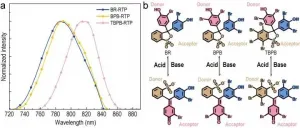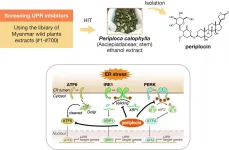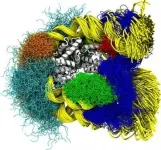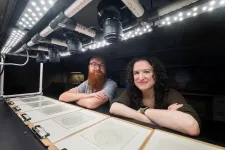(Press-News.org) A minimally-invasive procedure that targets the nerves near the kidney has been found to significantly reduce blood pressure in hypertension patients, according to the results of a global multicentre clinical trial led in the UK by researchers at Queen Mary University of London and Barts Health NHS Trust.
The study, published in The Lancet and presented at the American College of Cardiology meeting, suggests that the procedure could offer hope to patients with high blood pressure who do not respond to recommended treatments (resistant hypertension), and are at greatly increased risk of cardiovascular diseases, including stroke and heart attack.
The international clinical trial tested a one-hour procedure called 'renal denervation', which uses ultrasound energy to disrupt the nerves between the kidneys and the brain that carry signals for controlling blood pressure.
The study investigated 136 patients who were randomised to receive either renal denervation or a 'sham procedure' - the surgical equivalent of a placebo. The UK trial site at St Bartholomew's Hospital was the largest patient recruiter in the world, with patients also taking part in the United States, France, Germany, the Netherlands and Belgium
The trial showed that renal denervation led to a significant and safe blood pressure lowering effect after two months in patients who were on at least three different blood pressure lowering medications. It was found to reduce blood pressure by 8.0 mmHg, which was a 4.5 mmHg greater drop when compared with patients who had the sham procedure.
Additionally, there were no safety concerns in either the renal denervation or sham groups.
UK Principal Investigator Professor Melvin Lobo from Queen Mary University of London and Barts Health NHS Trust said: "This is probably one of the most important studies in the field of hypertension emerging in the pandemic era. It is conceivable that renal denervation could become a treatment option for patients with hypertension in the very near future and the National Institute for Health and Care Excellence (NICE) will be re-evaluating the technology based upon the recent datasets in the coming months."
Dr Manish Saxena from Queen Mary University of London and Barts Health NHS Trust said, who ran the study at St Bartholomew's Hospital, added: "Resistant hypertension patients often suffer from organ damage, including damage to the heart, eyes and kidneys, have poor quality of life and are at a higher risk of cardiovascular events and death.
"Many high risk patients have to manage multiple prescription medications, which can be difficult to adhere to and poses a significant challenge to our health care system and resources.
"Finding other ways to reduce blood pressure in these difficult-to-treat patients, such as renal denervation, will lower their cardiovascular risk, reduce their medication load, improve their quality of life and ultimately lead to cost savings for the NHS."
49 year old Raenard Gonzalez from Surrey received the procedure as part of the trial. He said: "I've been on blood pressure tablets for around 19 years, and for the last nine years, I've had to take five different tablets every day. It's been so difficult to manage, and the dosage was constantly increased by my consultant. I felt lethargic and it was hard to maintain a healthy weight, as I just had to keep eating to combat the tiredness and keep myself awake. I knew something wasn't right, but there didn't seem to be any other options for me.
"I heard about the trial and felt I had nothing to lose really. It was all quite straightforward, the procedure wasn't that invasive and just involved puncturing the skin, and I was able to go home that day, and didn't feel much pain.
"Since the procedure, I've managed to control my weight, and have so much more energy and motivation. My blood pressure used to stay high after any physical activity, but now, it doesn't matter how much I exert myself, my blood pressure always goes back down, which is great.
"All the medications that I took before the trial have been scrapped and I'm now just taking one triple combination pill. I'm really happy that this treatment may soon be available to other people."
INFORMATION:
The study was funded by ReCor Medical, Inc. which manufactures the Paradise®™ Renal Denervation System used in the study and had no role in data interpretation or writing of the report, other than providing assistance in formatting and copy editing.
For more information, please contact:
Joel Winston
Communications Manager (School of Medicine and Dentistry)
Queen Mary University of London
j.winston@qmul.ac.uk
Tel: +44 (0)7968 267 064
Notes to the editor
* Research paper: 'Ultrasound renal denervation for hypertension resistant to a triple medication pill (RADIANCE-HTN TRIO): a randomised, multicentre, single-blind, sham-controlled trial'. The Lancet. DOI 10.1016/S0140-6736(21)00788-1
Available here: https://www.thelancet.com/journals/lancet/article/PIIS0140-6736(21)00788-1/fulltext
About Queen Mary University of London
At Queen Mary University of London, we believe that a diversity of ideas helps us achieve the previously unthinkable.
In 1785, Sir William Blizard established England's first medical school, The London Hospital Medical College, to improve the health of east London's inhabitants. Together with St Bartholomew's Medical College, founded by John Abernethy in 1843 to help those living in the City of London, these two historic institutions are the bedrock of Barts and The London School of Medicine and Dentistry.
Today, Barts and The London continues to uphold this commitment to pioneering medical education and research. Being firmly embedded within our east London community, and with an approach that is driven by the specific health needs of our diverse population, is what makes Barts and The London truly distinctive.
Our local community offer to us a window to the world, ensuring that our ground-breaking research in cancer, cardiovascular and inflammatory diseases, and population health not only dramatically improves the outcomes for patients in London, but also has a far-reaching global impact.
This is just one of the many ways in which Queen Mary is continuing to push the boundaries of teaching, research and clinical practice, and helping us to achieve the previously unthinkable.
The fluorescence dyes were dominant species of the near-infrared (NIR) dyes, but the energy gap of the NIR dyes between S1 state and S0 state is generally small to induce the ultrafast internal conversion dynamics to quench the NIR emission of the fluorescence dyes. Therefore, the quantum yield of the fluorescence NIR dyes is usually low. On the other hand, the organic dyes with room-temperature phosphorescence (RTP) in the NIR region could prevent the ultrafast internal conversion dynamics quenching because of the T1 state and S0 state the organic molecules are spin forbidden.
Recently, scientists in China reported a new assumption to construct ...
The Spanish Foundation for Science and Technology (FECYT) has presented this week at the headquarters of the National Science and Technology Museum in Madrid the main results of the 10th Social Perception of Science Survey carried out in 2020.
The presentation was attended by Pedro Duque, Minister of Science and Innovation, Josep Lobera, Professor of Sociology at the Autonomous University of Madrid (UAM) and scientific co-director of the Survey and the subsequent study, and Rosa Capeáns, Director of the Scientific Culture and Innovation Department of FECYT. Pampa García, Editor-in-Chief of the SINC Agency, moderated a debate in which the results were presented in six blocks: Interest in ...
In the present study, Dr. Hidetoshi Hayashi (Professor, Nagoya City University) and collaborators screened small-molecule compounds that suppress UPR, using Myanmar wild plant extracts library. The screening system to track X-box binding protein 1 (XBP1) splicing activity revealed that the ethanol extract of the Periploca calophylla stem inhibited the inositol-requiring enzyme 1 (IRE1)-XBP1 pathway. They isolated and identified periplocin as a potent inhibitor of the IRE1-XBP1 axis. Periplocin also suppressed other UPR axes, protein kinase R-like endoplasmic reticulum kinase (PERK), and activating transcription ...
Researchers from the Hubrecht Institute in Utrecht (The Netherlands) and the Max Planck Institute for Molecular Biomedicine in Münster (Germany) used computer simulations to reveal in atomic detail how a short piece of DNA opens while it is tightly wrapped around the proteins that package our genome. These simulations provide unprecedented insights into the mechanisms that regulate gene expression. The results were published in PLOS Computational Biology on the 3rd of June, 2021.
Every cell in the body contains two meters of DNA. In order to fit all the DNA ...
Health has always been affected by climate and weather, but is increasingly clear that the change in climate is a significant threat to human health. The World Health Organization (WHO) estimates that 24% of global deaths are linked to environmental factors [1]. Climate change and pollution can lead to undernutrition, mental disorders, and noncommunicable diseases including chronic kidney disease and acute kidney injury [2].
The burden of addressing the death and disability associated with climate change falls to nephrologists and other healthcare professionals. At the same time, the healthcare sector makes a major ...
SGLT2 inhibitors (gliflozins) were developed as oral antidiabetics. They enhance urinary glucose excretion by inhibiting SGLT-2 (sodium-dependent glucose co-transporter-2) in the renal tubuli. The discovery of kidney benefits beyond the lowering of blood sugar has been made by Professor Christoph Wanner from Germany: The EMPA-REG OUTCOME study [2] initially showed that the rate of cardiovascular events in type 2 diabetic pa-tients is significantly reduced if the SGLT2 inhibitor empagliflozin is administered. Kidney function in diabetics who already had diabetic nephropathy was also found to benefit sig-nificantly from the treatment ...
HOUSTON - (June 7, 2021) - If identical versions of 20 people lived out their lives in dozens of different worlds, would the same people be popular in each world?
If you substitute "fruit flies" for "people" in that question, you have a fair description of a Rice University study showing that the evolution of social structures and the positions of individuals within those structures are based partly on genetics.
Cloned fruit flies played a starring role in the study that researchers jokingly likened to "The Truman Show," with video cameras observing how the flies behaved in a controlled environment.
In the study published online this week in Nature Communications, Rice bioscientists Eric Wice and Julia Saltz ...
The kidneys are a target organ of COVID-19 and are affected very early in the course. However, this is precisely where there is strong prognostic potential: As early as last spring, COVID-19-associated nephritis was identified as an early warning signal for severe courses of the infectious disease and studies to that effect were published [1]. In that regard, the research group led by Professor Oliver Gross, Department of Nephrology and Rheumatology at Göttingen University Medical Center (UMG), screened 223 patients in a study and included 145 of them as a predictive cohort. Study endpoints were ICU admission or mortality. As a result, early urinary changes ...
It was clear at a relatively early stage of the pandemic that SARS-CoV-2 causes a wide range of symptoms; in addition to typical respiratory symptoms, patients also had neurological symptoms (starting with anosmia), gastrointestinal symptoms, elevated liver values, and renal, urinary or hematological changes, for example. The fact that such findings occurred not only in severely ill patients with general organ dysfunction suggested that the virus may potentially cause disorders in various organs directly, i.e. that it causes a multi-system disease.
In spring 2020, at the very beginning of the pandemic, the authorities in Hamburg ordered autopsies be performed on all patients who had died with COVID-19. This resulted in one of the ...
Various viruses and bacteria have long been known to cause autoimmune diseases where there is such a predisposition. This phenomenon also seems to play a major role in SARS-CoV-2, especially in severe courses. The body's own immune cells are activated, with the formation of autoantibodies that attack the body's own healthy cell structures (proteins, autoantigens); deposits of immune complexes can then trigger severe inflammatory processes and cell destruction in the body.
Some nephrological diseases are likewise of autoimmunological etiology, one example being systemic lupus erythematosus (SLE), a chronic, mostly relapsing-remitting inflammatory disease with life-threatening ...




